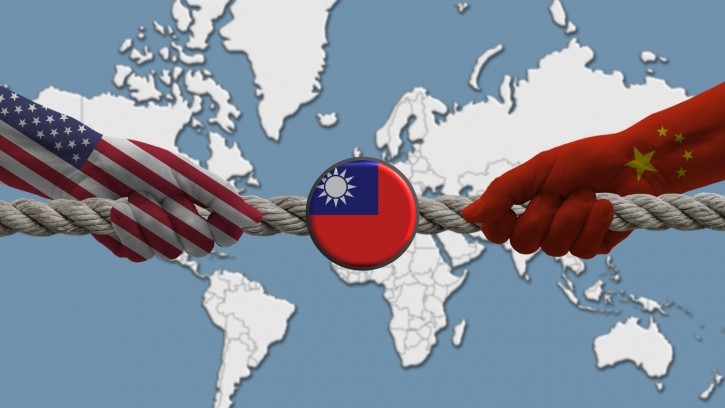Geopolitical tensions between the US and China and the effect on life sciences

She has a PharmD-PhD in Medical Physics and is a seasoned professional with a deep understanding of healthcare, law, and regulatory affairs.
OSP was extremely keen to speak to Caroline and dig deep into a major talking point in the industry - the geopolitical tensions between the US and China and to find out everything we could about the Biosecure Act.
How have ongoing geopolitical tensions between the United States and China led to an influx of regulations affecting industries such as life sciences, and what specific challenges do these regulations pose for pharmaceutical companies?
The ongoing geopolitical tensions between the United States and China have had a significant impact on various industries, including life sciences, by triggering a surge in regulatory measures which aim to address and navigate complex security and trade challenges. These regulations pose various challenges for pharmaceutical companies which may include increased operational costs, rapid adaptation to new regulatory environments, potential delays to research and development processes, and legal and financial risks for non-compliance, all of which directly affect how companies can operate and expand globally.
A pertinent example is the BIOSECURE Act, which emphasizes the strategic need to strengthen biosecurity in response to these tensions and introduces stringent compliance requirements for pharmaceutical companies.
Can you provide insights into the potential impact of the proposed BIOSECURE Act on pharma companies in the United States, particularly in terms of their ability to collaborate with Chinese biotech contractors, and what consequences might arise if this legislation is enacted?
The BIOSECURE Act specifically targets companies deemed to be "biotechnology companies of concern" by imposing restrictions that prevent U.S. companies receiving federal grant money from collaborating with certain Chinese biotech service providers. RegASK anticipates that the proposed Act will have a significant impact as it includes notable companies such as WuXi AppTec and its affiliates, which are major players in the biotech service industry and depend heavily on the United States marketplace. In fact, the Financial Times reported that 66% of WuXi AppTec’s revenues were generated from the U.S. in the previous year, and a respective 46% for Wuxi Biologics.
These restrictions could force U.S. pharmaceutical companies to reassess their supply chains and manufacturing strategies as many U.S. pharmaceutical companies currently rely on these Chinese contractors for cost-effective manufacturing and R&D services. The need to find alternative partners, equipment and services could lead to increased costs and delays in drug development and production, potentially hindering the launch of new pharmaceutical products in the U.S. market or causing products to be temporarily unavailable.
Furthermore, the legislation reflects a broader U.S. strategy to "de-risk" from China amid ongoing geopolitical tensions. The proposed changes signal a shift towards more restrictive interaction with Chinese firms, which may lead to a strategic overhaul of how American companies manage their international collaborations and protect their operational data.
What are the key factors that pharmaceutical companies should consider in effectively tracking regulations related to international business partnerships, and how can they stay ahead of potential regulatory changes to ensure compliance?
From RegASK’s perspective, pharmaceutical companies should consider several key factors in effectively tracking regulations related to international business partnerships to ensure compliance. Key considerations include:
Robust Regulatory Intelligence: Maintain a robust system for monitoring regulatory changes across different jurisdictions to aid with planning and compliance. This includes staying up to date with legislative developments like the BIOSECURE Act.
Local Expertise: Engage with local legal and regulatory experts who specialize in biotechnology and life sciences regulations. These professionals can provide insights into how specific laws like the BIOSECURE Act may impact business operations and international collaborations.
Risk Assessment and Management: Conduct thorough risk assessments to understand the impact of new regulations on existing contracts and operations. This involves reviewing relationships and contracts with international partners that might be affected by regulations such as those proposed in the BIOSECURE Act.
Proactive Compliance Strategy: Develop a proactive compliance strategy that anticipates changes in the regulatory environment. This entails preparing for potential scenarios where changes like those proposed in the BIOSECURE Act come into effect, impacting contracts and supply chains.
Due Diligence in Partner Selection: Strengthen due diligence processes to ensure that international partners comply with new and existing regulations. This is particularly important considering laws that could restrict interactions with companies from certain countries.
Staying Informed: Remain abreast of regulatory changes and understand their implications through continuous learning and adaptation. This can be done through tracking updates related to laws like the BIOSECURE Act and understanding their broader implications on the life sciences sector.
Given the complexities of global regulatory environments, what strategies do you recommend for pharma companies to proactively prepare for regulatory shifts and navigate the changing landscape of international collaborations?
RegASK suggests the following strategies for pharmaceutical companies to proactively prepare for regulatory shifts and effectively manage international collaborations:
Develop a Comprehensive Regulatory Strategy: It is crucial for pharmaceutical companies to develop a robust global regulatory strategy that includes regional requirements while aligning with overarching global regulations. Regular reviews and updates to this strategy are necessary to adapt to the ever-changing regulatory landscape, ensuring that the strategy remains effective and compliant.
Engage in Continuous Learning and Networking: Attending industry conferences, such as the RAPS Global Regulatory Strategy Conference, provides valuable insights into current and emerging trends. These events offer opportunities to engage with experts, discover innovative tools, and learn practical solutions to complex regulatory challenges.
Utilize Regulatory Intelligence Tools: Implementing advanced regulatory intelligence tools can aid in staying current with global regulatory changes. These tools help track and interpret regulatory updates, ensuring companies are always ahead of the curve.
Invest in Professional Development: Encouraging ongoing education and training for regulatory professionals within the company to ensure that the team not only understands the current regulatory framework but is also prepared to respond to changes proactively. This can include webcasts and training sessions that focus on global regulatory strategies and the latest regulatory practices.
These proactive measures will help pharmaceutical companies manage risks associated with international regulations and maintain a competitive edge in the global market.
How can companies streamline their regulatory affairs processes to enhance efficiency and agility in responding to new regulations, especially those driven by geopolitical tensions between major economic powers like the United States and China?
When addressing the challenges of regulatory changes driven by geopolitical tensions, like those between the U.S. and China, it's crucial to adopt a proactive and informed approach. At RegASK, we emphasise the importance of active monitoring, which involves using advanced, AI-driven tools to continuously track and interpret regulatory updates. This is complemented by gaining local insights—tapping into a network of local experts understand the nuances of regional regulations can make a substantial difference.
Additionally, leveraging collective knowledge within the company helps cultivate a rich internal repository of best practices and regulatory strategies. Strong collaborations, both internally and with external partners, are also key as they enable the sharing of insights and foster innovative approaches to compliance.
Anticipating future regulatory trends plays a critical role as well. Using predictive analytics helps us prepare our clients not just to react to changes, but to be steps ahead. This combination of strategies enhances our agility and efficiency, empowering us to better navigate the complex global regulatory environment for our clients.
In your view, what role does collaboration and information-sharing play in helping pharmaceutical companies adapt to evolving regulatory requirements, particularly in the context of international business partnerships?
By leveraging knowledge across international business partnerships and information-sharing, companies can integrate diverse local insights. This enriches their understanding of global compliance landscapes, enabling them to anticipate and adapt more effectively to regulatory changes. Such collaboration not only streamlines compliance processes but also enhances strategic decision-making, ensuring pharmaceutical innovations can meet complex international standards efficiently. That’s why it is crucial to capture these interactions and knowledge along the way to be able to tap into when needed, and constantly augment your pool of acquired company knowledge.
How do you foresee the regulatory landscape evolving in the future, particularly in light of ongoing geopolitical tensions, and what implications might this have for pharmaceutical companies seeking to expand their global footprint?
RegASK expects to see the regulatory landscape continue to evolve significantly, influenced heavily by geopolitical tensions. This evolution can have profound implications for pharmaceutical companies aiming to expand globally. The interconnected nature of biopharma, being a long-term play with substantial investment, means that companies must carefully consider supply chain risks.
Pharmaceutical companies need to adopt a forward-thinking approach, integrating robust risk management strategies to handle potential disruptions. By planning for long-term resilience and compliance, companies can better navigate the complexities of global expansion amidst uncertain geopolitical climates.
What resources or tools do you recommend for pharmaceutical companies to effectively monitor and track regulatory changes related to international partnerships, and how can they integrate these into their existing compliance strategies?
At RegASK, we strongly recommend that pharmaceutical companies incorporate technology to effectively monitor and track regulatory changes, especially in the context of international partnerships. Advanced software and Generative AI-driven tools can vastly improve the efficiency of capturing real-time regulatory updates across different regions. Leveraging knowledge from local experts is also crucial. These experts provide invaluable local insights into regional regulatory landscapes, which can be integrated into a company’s existing compliance strategies through centralized databases and collaborative platforms. By combining cutting-edge technology with local expert knowledge, and ensuring this data is accessible to every stakeholder anytime, companies can ensure robust and responsive compliance frameworks that align with global standards.
What proactive measures can pharma companies take to mitigate the risks associated with regulatory uncertainty and ensure continuity in their operations, especially in the context of cross-border collaborations affected by geopolitical dynamics?
We advise pharmaceutical companies to take proactive measures to de-risk their supply chains, particularly in the context of cross-border collaborations affected by geopolitical dynamics. Implementing robust regulatory intelligence systems is crucial to provide real-time insights into global regulatory changes and potential disruptions. Pharmaceutical companies should further implement increased levels of planning for risk mitigation within their strategy development, program deployment, and operations. Companies should anticipate various political scenarios, analyze corresponding risks, and prioritize their responses. By developing strategic programs that include robust operational plans, companies can mitigate risks associated with regulatory uncertainty and ensure continuity in their operations.













